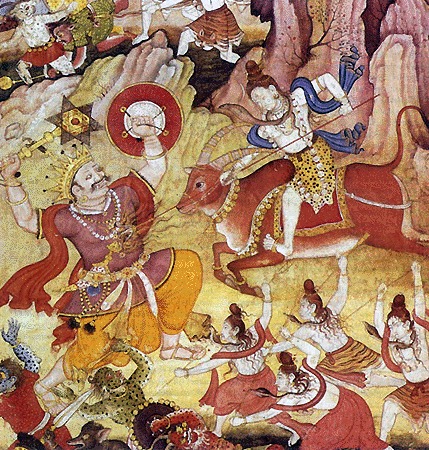Our ancient literature and mythological books are full of stories – citing friendship, faith, dutifulness, leadership, dedication, compassion etc. Like always, I get ideas – relating their perspective to our jet age life, where I deal with people at various levels in different organizations. Being a L&D professional I have been working on bringing change to organizations and wondered if I could really link the very phrase‘Har Har Mahadev’.
We all have heard this phrase several times in temples, in recitals and in prayers. The perspective clicked to me while reading about the Dharamyudha in which Lord Shiva, the Mahadev as explained by Amish in his book, coined the phrase to empower his team of warriors.
I learned a new perspective of people management and people empowerment while reading this particular part in the story. It is the battle field and the entire team is ready to work for the betterment of their reign and its people. The weak, the strong, the proven and the laggards – all want to contribute and excel.
Identifying traits & Leadership Style
In ancient times, it was one God, one king or one leader for all. The delegation though happened in those times too but was only limited to the set of duties. The belief and onus of responsibility was put on just one person of each clan – in this case, it is the ‘Neelkanth’ – who was believed to be the messiah for the people of Meluha who waited for him to come & fight for their rights and save them from the Chandravanshi’s and the Nagas. Now the ‘Neelkanth’ has arrived who is like a new leader who is given the onus of leading the state in the best way possible, as per the rules laid by the state which has its own weaknesses and threats owing to the idealism and self belief of the population. He is trying to get into the system as he apparently is highly opinionated and believes in Karma – the good and bad. He is someone who doesn’t believe in being restricted by the man-made rules and believes in the Power of Expression, Equality and Performance over scores & class.
Now isn’t that something which we all are aiming for in life and more importantly in everyday work life? We all try each day to strike a balance with our leaders (read bosses) who we want to be non-biased. A participant leader is always a welcome in a career life. It leads to mutual growth and understanding. It is the thing everybody hopes for to make the journey pleasant.
Authority
If a person seems important to us, we listen to that person. The person who is perceived as an outsider suddenly is been looked up to and heard of as a leader, a savior. Reason – we feel the person is important, possess power and authority and can help us gain benefit.
Authority is a decisive adjective and that is why people in authority shall be chosen with great discretion and in full faith. While Shiva coined the term ‘Har Har Mahadev’ for his team, he wins hearts and trust of his team. Because he embraced authority with great liberation and he shared his power with his team by delegating the authority and empowering the meritorious. In the mentioned Dharamyudh its ‘Drapaku’ who is made the leader by Shiva for his pure talent & patriotism for the state.
People Empowerment
The above two are only considered worthwhile if they are used for the growth & up-liftment of the team, the resources and are made to work towards a goal which will yield results that are good to the people, the organization at large.
Where it is the contribution and the result that matters most, the delegation of the team is done as per the skill-set possessed by each of them and where the sense of belongingness is inculcated deep within.
The story about inception of the phrase ‘Har Har Mahadev’ guided me to the base of this human resource practice. It is about the following qualities which enable employee empowerment. When Lord Shiva told his team that it is not about him being a Mahadev but it is that each one around is a Mahadev in himself. Here, he is bringing in the concept of people empowerment and bringing in the sense of belonging which is currently practiced as ‘Employee Management & Industrial Relations’.
This is what the current day HRM practices aspires for. Team, group dynamics and synergy are not just terms – they really carry a lot of meaning & weightage. The age old literature, the history vouches for it and the present day start-ups seems friendlier towards it. They value individual traits, personal skill-set, personality and interests more than the KRA, the task at hand and the targets on paper.
The ancient mythological philosophies certainly carry a lot of management lessons and this is what stuck my mind when I read about ‘Har Har Mahadev’. Particularly if we talk in context of team empowerment, participant leadership, passion & compassion before rules, Lord Shiva gives me so many relevant stories.
